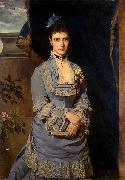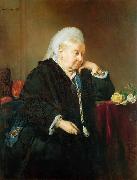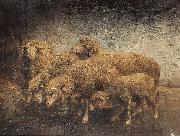|
Here are all the paintings of Heinrich von Angeli 01
| ID |
Painting |
Oil Pantings, Sorted from A to Z |
Painting Description |
| 71878 |
 |
Portrait of Grand Duchess Maria Fiodorovna |
Portrait of Grand Duchess Maria Fiodorovna (1847-1928)
1874(1874)
Oil on canvas
126 x 89 cm (49.61 x 35.04 in)
|
| 73340 |
 |
Portrait of Grand Duchess Maria Fiodorovna |
Date 1874(1874)
Medium Oil on canvas
Dimensions 126 X 89 cm (49.61 X 35.04 in)
cyf |
| 97621 |
 |
Portrait of Queen Victoria as widow |
1899(1899)
Medium oil on canvas
Dimensions 120 x 93.3 cm
cyf |
| 24229 |
 |
Queen Victoria (Empress of India) (mk25) |
1885 |
| 24296 |
 |
Queen Victoria in Mourning (mk25) |
1899 |
| 97502 |
 |
Sheep in a barn |
Oil on canvas, 69 x 89 cm
Date 1885(1885)
cyf |
|
|
| Heinrich von Angeli
|
| 1840 - 1925
Austrian painter. In 1853 he moved to Vienna to live with his uncle, who was a collector and a friend of the painters Friedrich von Amerling and Mathias Ranftl (1805-54). Angeli's early Self-portrait reflects the precocious maturity of his style, and in 1854 he enrolled at the Akademie der Bildenden K?nste in Vienna. In 1856, on the advice of Amerling, he went to study under Emanuel Gottlieb Leutze in D?sseldorf, where he executed one of his most significant history paintings, Mary Stuart Reading her Death Warrant (1857). In 1859 he moved to Munich, where he worked independently and was encouraged by Karl Theodor von Piloty, producing the history paintings Ludwig XI and Franz de Paula (1859) and Antony and Cleopatra for Ludwig I of Bavaria. In 1862 he again settled in Vienna, where he enjoyed increasing success. The life-size portrait of Baronin Seidler and the genre painting Avengers of Honour (1869), both exhibited at the Weltausstellung in Vienna in 1873, secured his reputation. After brief stays in Paris and Berlin (c. 1866), he went in 1871 to Italy, where he painted numerous portraits and the genre work Absolution Denied. His final genre paintings, Youthful Love (sold London, Sotheby's, 3 Oct 1980) and Calabrian Shepherd Couple, also date from this year. Henceforth he devoted himself entirely to portrait painting, receiving important commissions from such aristocratic circles as the Kinsky and Auersperg families (e.g. Graf Anton Alexander Auersperg, 1876; Vienna, Pr?sidium des Nationalrates). Whereas his early portraits were influenced by Amerling, Anton Einsle and 17th-century Dutch art, from the 1870s he developed his own elegant and restrained style. This helped him to obtain commissions at the courts of Vienna, St Petersburg and London
|
|

